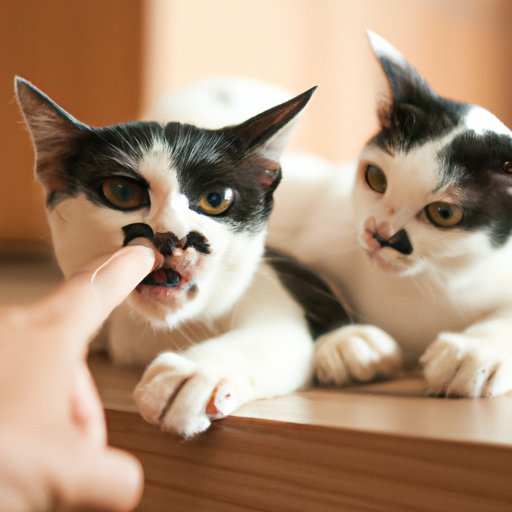Introduction
Many cat owners may have experienced their furry friend biting them, which can be both painful and confusing. While cats are generally gentle creatures, biting behavior can sometimes frustrate their owners and cause a rift in their relationship. This article seeks to explore the reasons why cats bite their owners and provide effective solutions to prevent this behavior.
7 common reasons why your cat may be biting you
There are several reasons why your cat may bite you, ranging from their natural instincts to medical issues. These reasons include:
- Predatory instincts: Cats are natural hunters and may perceive moving hands and feet as prey, causing them to bite when they’re in hunting mode.
- Play aggression: Cats may bite their owners when they’re in a playful mood, which can sometimes become aggressive if they get too excited.
- Fear or anxiety: Cats may bite their owners if they’re afraid or stressed, as biting can sometimes be a defense mechanism for them.
- Medical issues: In some cases, cats may bite their owners if they’re experiencing pain or discomfort, such as dental issues or arthritis.
- Territorial aggression: Some cats may view their owners as intruders in their territory, causing them to bite or scratch to defend their space.
- Overstimulation: Cats may become overstimulated during petting or play sessions and may bite to signal that they’ve had enough.
- Redirected aggression: Cats may bite their owners if they’re unable to reach the source of their aggression, such as a neighbor’s cat outside the window.
Understanding which reason applies to your cat’s behavior is the first step in addressing their biting.
Understanding the behavior of cats: why they bite their owners
Cats have natural instincts and behaviors that can sometimes result in biting behavior towards their owners. For example, cats have a strong need to hunt and play, and they need to establish boundaries and territory. When these instincts are not fulfilled, they may resort to biting.
It’s important for cat owners to understand these natural instincts and behaviors to better understand their cat’s behavior.
Is your cat’s biting behavior a sign of love or aggression?
While cats may sometimes bite their owners out of love, such as to show affection or seek attention, it’s important to differentiate between this behavior and aggressive biting. Aggressive biting can include biting and attacking unprovoked, and may be a sign of a deeper issue such as fear or anxiety.
Understanding the difference between these behaviors can help cat owners address the underlying issue causing the biting behavior.
The psychology behind a cat’s biting behavior towards their owner
A cat’s psychology and emotions can greatly influence their biting behavior. Factors such as their personality, past experiences, and environment can all play a role in their behavior towards their owners. Understanding these factors can help cat owners identify the underlying cause of their cat’s biting behavior and take steps to address it.
How to stop your cat from biting you: effective techniques and tips
There are several effective techniques and tips that cat owners can use to prevent and stop biting behavior, including:
- Positive reinforcement: Rewarding your cat for good behavior and ignoring bad behavior can help encourage positive behavior and reduce biting.
- Redirecting: Distracting your cat with toys or treats when they’re in a biting mood can help redirect their attention.
- Playing: Providing your cat with enough playtime and toys can help them release their energy in a healthy way.
- Training: Training your cat to respond to certain commands or signals can help prevent biting behavior.
It’s important to find the method that works best for your cat and consistently apply it to help stop biting behavior.
Are you unknowingly encouraging your cat to bite you? Find out
Some cat owners may unknowingly encourage biting behavior in their cats, such as rough play or inconsistent boundaries. Identifying these behaviors and rectifying them can help prevent further biting behavior and strengthen the bond between cat and owner.
The impact of a cat’s traumatic past on their biting behavior towards their owner
A cat’s past experiences, such as abuse, neglect, or abandonment, can impact their behavior and cause them to develop biting tendencies. Understanding these past traumas and providing resources to help your cat recover can lead to a healthier and happier relationship between you and your furry friend.
Conclusion
Understanding why cats bite and knowing how to prevent and stop biting behavior is essential for cat owners. From identifying the reasons behind their biting to using effective techniques and tips to prevent it, addressing this behavior can lead to a stronger bond between cat and owner.
By understanding a cat’s natural instincts and behaviors, psychology, and past experiences, cat owners can take steps to help their cat feel safe and secure and reduce the likelihood of biting behavior.
